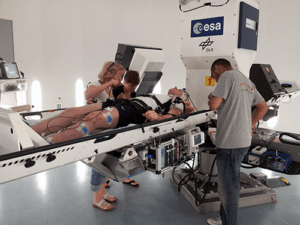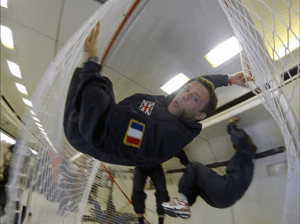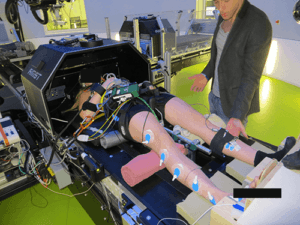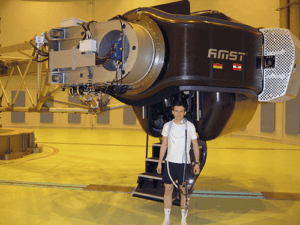Profile
Charlie Laing
Curriculum Vitae
-
Education:
🎓 BSc (Hons) in Biomedical Sciences (Physiology) from University of Aberdeen; MSc in Space Physiology and Health from King’s College London; Associateship of King’s College (AKC) from King’s College London
-
Qualifications:
🎓 BSc, MSc, AKC and (almost done) PhD
-
Work History:
👔 National Association of College and University Entrepreneurs (NACUE), UK Parliament and various scientific research groups (incl. University of Aberdeen, King’s College London, Royal Air Force Centre of Aviation Medicine, German Aerospace Center, Medical University of Graz, Simon Fraser University)
-
Current Job:
Space Physiology Researcher 🚀
-
Employer:
💼 German Space Agency 🇩🇪 (DLR) and PhD research at King’s College London 🇬🇧
-
My work
I’m a British 🇬🇧 space physiologist working for the German Space Agency 🇩🇪 on new ways to keep astronauts healthy on a long duration missions – such as one to Mars 🚀
-
Read more
My main research is looking at how a human centrifuge (spinning people) can prevent astronauts from getting sick after long periods in space.
Astronauts’ bones and muscles get weaker in space and their blood shifts up towards the head which confuses the body and changes how the heart responds ❤. By spinning astronauts we can create gravity in space (artificial gravity!) and prevent muscle and bones getting smaller and weaker 💪📉, and bring the blood back from the head to the legs again 👖.
Astronauts currently exercise a lot in space (around 2 hours a day ⌚) but when they come back around half of them still have problems with randomly fainting 😰. This is not good if you are holding a press conference in front of the media (see here) and it would certainly be a problem when you land on Mars and want to start work after the long journey from Earth 🌍.
I am interested in the heart and how it adapts to weightlessness in space and the force of gravity on return to Earth. Using a human centrifuge we can explore the best way to stress the whole body and test how this can be used by future astronauts to allow them to stay healthy on their way to Mars.
See our centrifuge here
You can follow me on twitter here
-
My Typical Day
If we have an experiment running we will welcome our participants and make sure they have followed all the pre-testing protocols. The most important for researching the heart is to make sure they have not taken anything that would affect its function (that means no coffee ☕ in the morning if you want a go on our centrifuge!).
-
Read more
On a day where we are not testing I will typically look over my collected data and try to make sense of it all. I will maybe plot some graphs 📊 to look over with my colleagues and discuss what the results could potentially mean.
At the moment we are particularly busy with the current studies running and preparations for the return of Tim Peake from Space. He will be our participant for a week or so when he comes back where we will test his muscles, bones, urine, blood and saliva 🔍💉💊!
-
What I'd do with the prize money
I would use the money to host videos of a virtual tour for all pupils of :envihab including our centrifuge, astronaut laboratories, and the European Astronaut Center; and show pupils some of the cool stuff space scientists do in the lab! Also, I want to send the winning schools some astronaut food to taste!
-
My Interview
-
How would you describe yourself in 3 words?
Curious. Fun. Motivated.
What was your favourite subject at school?
Definitely Maths and Science – even from a young age I loved it.
What did you want to be after you left school?
I always wanted to be Prime Minister but now I really want to be an astronaut!
Were you ever in trouble at school?
When I was younger my inquisitive mind definitely got me into hot water and I think sometimes I asked way too many questions! However, as I got older I was able to be less cheeky and actually was elected Head Boy so it wasn’t all bad.
What is the most fun thing you've done?
Last year I took part in a parabolic flight (the so-called vomit comet) with the French Space Agency 🇫🇷 conducting a human physiology study. It was like swimming but without the water! I’m happy to report I didn’t get sick but it was a great experience and on my particular flight there were friendly Chinese astronauts 🇨🇳 (taikonauts) on board getting some of their training.
-
-
Work photos:
⬇ Conducting research on the short-arm human centrifuge in :envihab.

.
⬇ Participating as a subject on the European Space Agency centrifuge.

.
⬇ Taking part in the French Space Agency parabolic flight campaign.

.
⬇ Making final checks with the participant before the centrifuge started.

.
⬇ Taking part in research at the Long-arm human centrifuge on the
German Air Force base in Dresden.

.
⬇ Inside the ‘cockpit’ of the centrifuge used to train fighter pilots and
simulate the g-forces during real flight.

.
⬇ All my colleagues working at the Institute for Aerospace Medicine at
the German Space Agency in Cologne.
[myimage7 centre]
